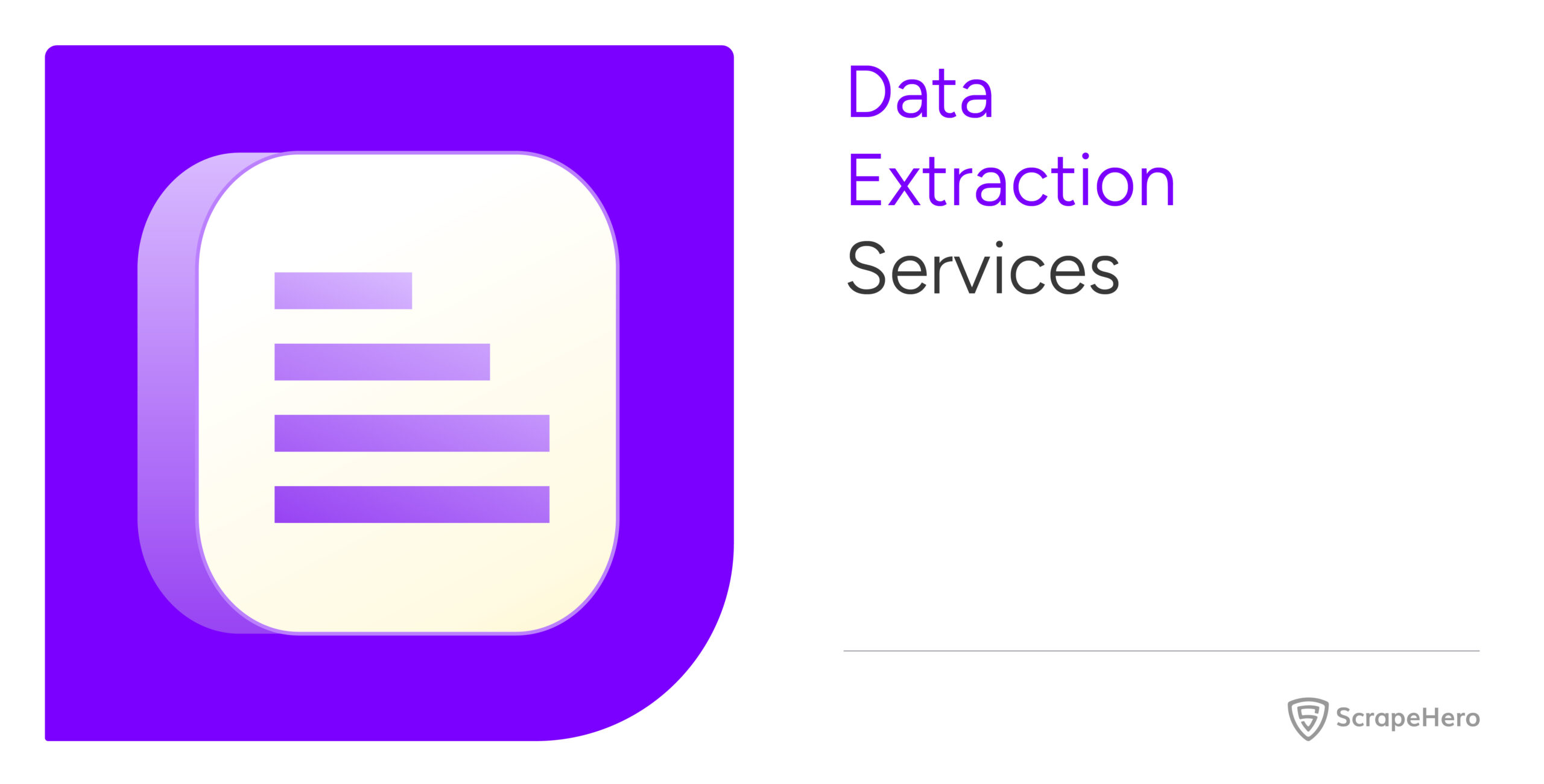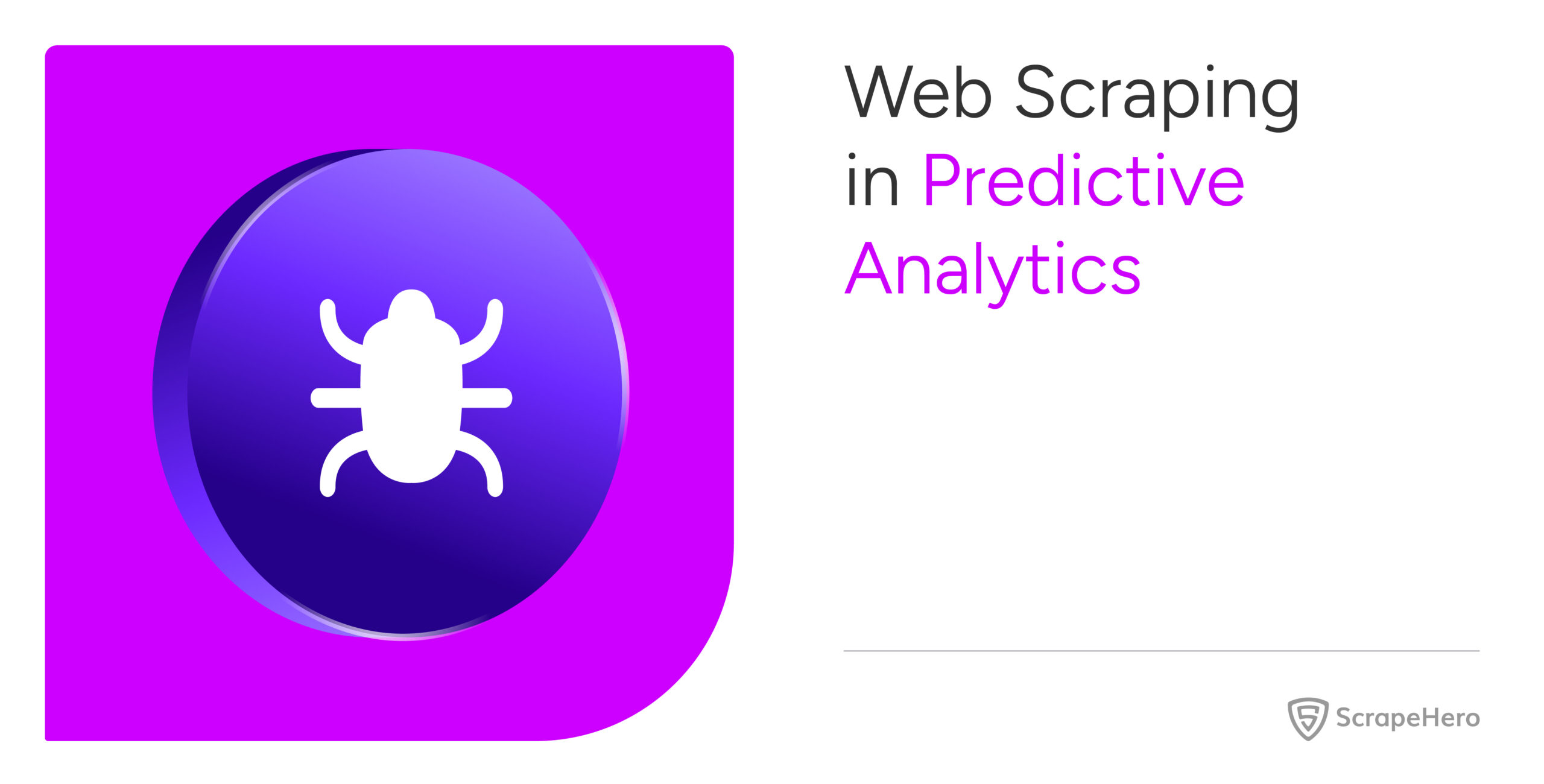Recognizing fresh market opportunities and trends is fundamental for any business aiming to thrive and evolve. Web scraping is one of the critical resources available to streamline this process. It enables organizations to methodically gather and then scrutinize online data to find out the trends and patterns.
This approach provides a rich understanding of the market’s current state and reveals opportunities for potential growth. Thus, by identifying market opportunities for business growth by web scraping e-commerce websites, brands will have the insights needed to make strategic decisions. This will help them swiftly adapt to changing market conditions and secure a competitive position in their fields.
Let us now understand how to improve your business using web scraping.
The Benefits of Understanding Market Trends
Identifying and understanding market trends is about strategically positioning your business for sustained success and growth. In a world where market dynamics shift rapidly, the importance of market research for startups and corporations cannot be overstated. It is the ability to recognize and adapt to these changes that sets leading businesses apart.
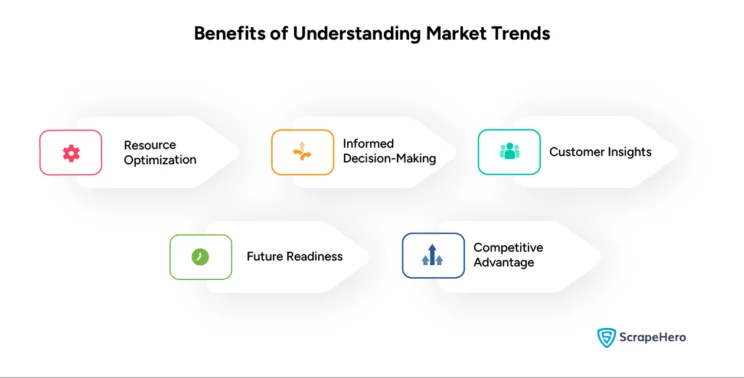
Informed Decision-Making
Identifying market trends equips businesses with the knowledge to make well-informed decisions. It offers a clear view of the industry landscape, helping companies anticipate changes and respond effectively. This foresight is crucial for strategic planning and risk management, ensuring that decisions are not just reactive but proactive and data-driven.
Customer Insights
Grasping market trends provides deep insights into customer behavior and preferences. This understanding allows businesses to tailor their products and services to meet the needs of their target audience. It fosters a customer-centric approach, enhancing satisfaction and loyalty and ultimately driving sales and growth.
Competitive Advantage
Keeping abreast of market trends gives businesses a competitive edge. It helps identify emerging opportunities and threats, enabling companies to stay ahead of competitors. By being trend-aware, businesses can innovate, adapt their offerings, and differentiate themselves in the marketplace, securing a more advantageous position.
Resource Optimization
Understanding market trends aids in optimizing resource allocation. It ensures that investments in product development, marketing, and other business areas are aligned with market demands and future growth areas. This strategic alignment prevents resource wastage and maximizes return on investment.
Don’t want to code? ScrapeHero Cloud is exactly what you need.
With ScrapeHero Cloud, you can download data in just two clicks!
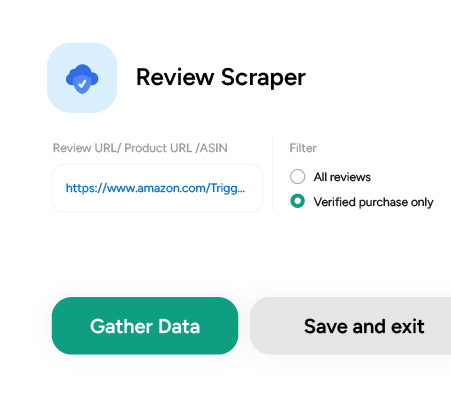
Future Readiness
Staying in tune with market trends prepares businesses for the future. It encourages a culture of agility and continuous learning, where companies are always ready to evolve and embrace new technologies and methodologies. This readiness is vital for long-term sustainability and success in an ever-changing business environment.
Who Can Benefit from Identifying Market Opportunities Using Web Scraping
Web scraping is a versatile tool that transcends industry boundaries, offering valuable data-driven insights to a wide array of businesses. In an age where information is power, having access to the most current and comprehensive data can be a game-changer.
Here, we highlight several sectors that can particularly benefit from identifying market opportunities for business growth using web scraping.
E-Commerce and Retail
For e-commerce and retail businesses, web scraping is instrumental in tracking competitor pricing, understanding customer reviews, and monitoring product demand trends. This data helps in optimizing pricing strategies, improving product offerings, and ensuring stock levels meet consumer demand.
For instance, an online fashion retailer can use web scraping to monitor competitor websites for pricing, product assortments, and stock levels. By analyzing this data, the retailer can identify, for example, if there is a rising trend in eco-friendly clothing and a gap in the market for affordable options. They can quickly launch a new line of sustainable yet cost-effective apparel, capitalizing on this trend before their competitors. This will lead to a significant increase in market share and customer loyalty.
Finance and Investment
In the finance sector, web scraping provides real-time market data, news sentiment analysis, and financial indicators, assisting in making informed investment decisions. This technology enables firms to spot market trends, assess risks, and discover investment opportunities swiftly.
A financial analytics firm can employ web scraping to gather news articles, social media posts, and financial reports. Through sentiment analysis of this data, they can detect trends like a growing positive sentiment toward electric vehicles. The firm can then advise its clients to invest in stocks of emerging electric vehicle companies. This early insight allows their clients to benefit from the industry’s subsequent growth, thereby gaining their trust.
Real Estate
Real estate data web scraping can be used by companies to gather data on property listings, market prices, and regional demand. This information aids in identifying investment hotspots, understanding market valuation trends, and formulating data-driven property development strategies.
For example, a real estate agency uses web scraping to collect data on property prices, time on the market, and neighborhood amenities across various regions. They analyze the data and identify that there is an increasing trend in remote work. So, they identify suburban areas with growing demand but insufficient supply. The agency can focus its property listings and marketing efforts on these areas, attracting a large number of buyers and sellers and thereby securing a dominant position in the market.
Travel and Hospitality
For the travel and hospitality industry, web scraping offers insights into customer preferences, hotel pricing trends, and service benchmarks. Businesses can use this data to tailor their services, adjust pricing dynamically, and enhance customer experience based on current market trends.
For instance, a hotel chain can utilize web scraping to analyze customer reviews and pricing strategies of competitors across different platforms. They might discover a growing trend for experiential travel and notice a lack of pet-friendly accommodations in key locations. Responding quickly, they can introduce pet-friendly rooms and custom local experiences. This strategic move will enhance their reputation, increase occupancy rates, and set them apart from competitors.
Healthcare
In healthcare, web scraping helps monitor patient feedback, pharmaceutical developments, and market trends like a growing number of retail health clinics, etc., in healthcare services. This information is crucial for healthcare providers and pharmaceutical companies to improve patient care, stay ahead of medical trends, and make informed R&D decisions.
A pharmaceutical company can use web scraping to track online forums, publications, and competitor announcements. Suppose they notice an increasing discussion and early research surrounding a particular rare disease. Sensing an unmet need, the company can reallocate resources to develop a treatment for this condition. Their proactive approach leads to the early market entry of a breakthrough drug, significantly improving patient outcomes and establishing the company as a leader in this niche market.
How to Determine Relevant Data for Your Specific Industry
Now that we have learned the importance of discovering new market opportunities and trends, let us see how to determine the most relevant data for your industry. Navigating the vast ocean of data available through web scraping can be overwhelming. To utilize its full potential, it’s crucial to pinpoint the specific data that aligns with your industry’s unique needs and objectives.
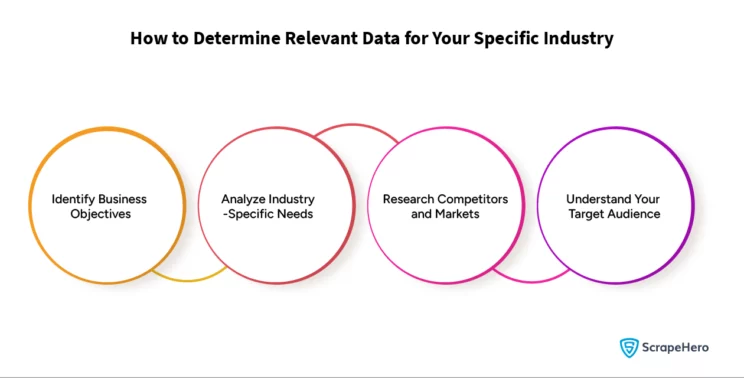
Identify Business Objectives
Start by clearly defining your business goals. Are you looking to enhance product offerings, optimize pricing strategies, or enter new markets? Setting clear objectives will guide your data collection process, ensuring that the data you gather is aligned with your strategic goals.
Analyze Industry-Specific Needs
Each industry has its own set of key performance indicators (KPIs) that drive success. For instance, in e-commerce, understanding consumer buying patterns, such as the most viewed products or peak shopping times, can be crucial. In contrast, for the real estate sector, monitoring property price trends and inventory levels might be more pertinent. Identifying these industry-specific needs ensures that the data you collect directly contributes to your strategic insights.
Research Competitors and Markets
Keeping a close eye on your competitors and the broader market trends can provide invaluable insights. By web scraping competitor websites, social media, and industry forums, you can gain a comprehensive view of their strategies, strengths, and weaknesses. This knowledge not only helps in benchmarking your performance but also in identifying gaps in the market that your business can capitalize on.
Understand Your Target Audience
Deeply understanding your target audience is key to the success of any business. Web scraping can be instrumental in gathering data on customer preferences, feedback, and behavior patterns across various digital platforms. This data can then be analyzed to tailor your products and services to meet the specific needs and preferences of your audience, thereby enhancing customer satisfaction and loyalty.
By focusing on these key areas, you can ensure that the data you collect through web scraping is relevant, actionable, and aligned with your business goals.
Identify Market Opportunities for Business Growth Using Web Scraping: In-house or Outsource
When deciding to do web scraping to uncover market trends and opportunities, businesses have to make an important decision: to build an in-house team or to outsource to specialized experts. While managing web scraping internally might seem appealing, it comes with its set of challenges, especially for companies whose core competency isn’t data scraping.
Let us explore the nuances of both approaches.
| In-House Web Scraping | Outsourcing to an Expert | |
| Resource Intensity | Requires substantial investment in technology and skilled personnel. | Outsourcing eliminates the need for heavy upfront investment in technology and training. |
| Maintenance and Scalability | Demands ongoing maintenance to adapt to website changes, manage data storage, and ensure scalability. | Providers offer scalable infrastructure that grows with your business, ensuring high uptime and reliability. |
| Legal and Compliance Issues | Navigating legal landscape requires legal expertise to ensure compliance with laws
and website terms of service. |
Outsourced services bring expertise in efficient, accurate, and legally compliant data scraping, reducing legal risks. |
| Access to Expertise | In-house teams may lack specialized experience, leading to a steep learning curve and potential inefficiencies. | Service providers bring years of specialized experience, ensuring efficient and legally compliant data scraping. |
| Cost | Can be high due to the need for technology, personnel, and ongoing maintenance. | Often more cost-effective in the long run, as it eliminates the need for upfront investment. |
| Focus on Core Business | Setting up and maintaining an in-house operation can divert focus from primary business activities. | Allows businesses to remain focused on core competencies. |
| Scalability and Reliability | Ensuring scalability and infrastructure reliability can be challenging and resource-intensive. | Professional services offer high scalability and reliability, ensuring a steady flow of data. |
While focusing on market trend analysis and opportunity identification, choosing between building an in-house team and outsourcing to a specialist like ScrapeHero depends on your business’s specific needs. For many, the efficiency, expertise, and ease that comes with an experienced partner like ScrapeHero make it the preferred choice to utilize the full potential of web scraping for business growth.
Closing Thoughts on the Importance of Identifying Market Opportunities
In summarizing the role of web scraping in identifying market opportunities, it’s evident that this technique is pivotal for data-driven decision-making and strategic business growth. Web scraping extends its benefits across various industries, enabling companies to anticipate market trends, understand consumer behavior, address unmet market needs, and effectively benchmark against competitors.
Opting for an enterprise-level web scraping service like ScrapeHero allows businesses to navigate the intricacies of web scraping confidently. we ensure that the data collected is comprehensive and aligned with the company’s strategic objectives. ScrapeHero’s dedication to providing scalable, reliable, and cost-effective service positions it as a preferred partner for web scraping.
In today’s data-centric business environment, understanding and effectively utilizing web scraping is crucial. With ScrapeHero as a partner, businesses can be assured of a streamlined path to utilizing the power of web scraping.






